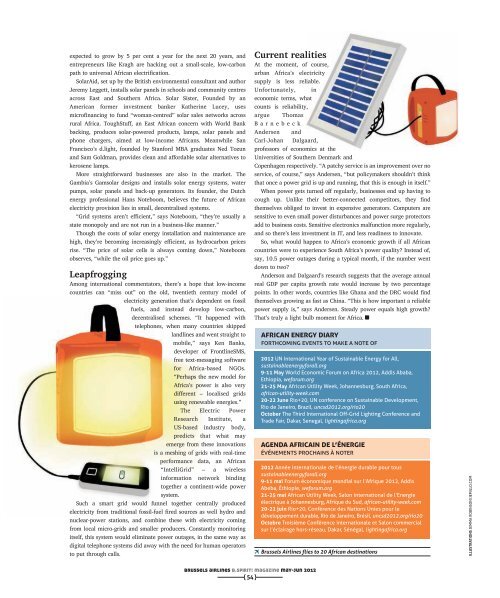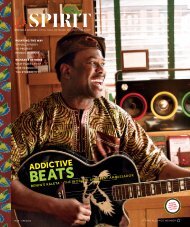may-2012
may-2012
may-2012
You also want an ePaper? Increase the reach of your titles
YUMPU automatically turns print PDFs into web optimized ePapers that Google loves.
expected to grow by 5 per cent a year for the next 20 years, and<br />
entrepreneurs like Kragh are hacking out a small-scale, low-carbon<br />
path to universal African electrification.<br />
SolarAid, set up by the British environmental consultant and author<br />
Jeremy Leggett, installs solar panels in schools and community centres<br />
across East and Southern Africa. Solar Sister, Founded by an<br />
American former investment banker Katherine Lucey, uses<br />
microfinancing to fund “woman-centred” solar sales networks across<br />
rural Africa. ToughStuff, an East African concern with World Bank<br />
backing, produces solar-powered products, lamps, solar panels and<br />
phone chargers, aimed at low-income Africans. Meanwhile San<br />
Francisco’s d.light, founded by Stanford MBA graduates Ned Tozun<br />
and Sam Goldman, provides clean and affordable solar alternatives to<br />
kerosene lamps.<br />
More straightforward businesses are also in the market. The<br />
Gambia’s Gamsolar designs and installs solar energy systems, water<br />
pumps, solar panels and back-up generators. Its founder, the Dutch<br />
energy professional Hans Noteboom, believes the future of African<br />
electricity provision lies in small, decentralised systems.<br />
“Grid systems aren’t efficient,” says Noteboom, “they’re usually a<br />
state monopoly and are not run in a business-like manner.”<br />
Though the costs of solar energy installation and maintenance are<br />
high, they’re becoming increasingly efficient, as hydrocarbon prices<br />
rise. “The price of solar cells is always coming down,” Noteboom<br />
observes, “while the oil price goes up.”<br />
Leapfrogging<br />
Among international commentators, there’s a hope that low-income<br />
countries can “miss out” on the old, twentieth century model of<br />
electricity generation that’s dependent on fossil<br />
fuels, and instead develop low-carbon,<br />
decentralised schemes. “It happened with<br />
telephones, when many countries skipped<br />
landlines and went straight to<br />
mobile,” says Ken Banks,<br />
developer of FrontlineSMS,<br />
free text-messaging software<br />
for Africa-based NGOs.<br />
“Perhaps the new model for<br />
Africa’s power is also very<br />
different – localised grids<br />
using renewable energies.”<br />
The Electric Power<br />
Research Institute, a<br />
US-based industry body,<br />
predicts that what <strong>may</strong><br />
emerge from these innovations<br />
is a meshing of grids with real-time<br />
performance data, an African<br />
“IntelliGrid” – a wireless<br />
information network binding<br />
together a continent-wide power<br />
system.<br />
Such a smart grid would funnel together centrally produced<br />
electricity from traditional fossil-fuel fired sources as well hydro and<br />
nuclear-power stations, and combine these with electricity coming<br />
from local micro-grids and smaller producers. Constantly monitoring<br />
itself, this system would eliminate power outages, in the same way as<br />
digital telephone systems did away with the need for human operators<br />
to put through calls.<br />
Current realities<br />
At the moment, of course,<br />
brussels airlines b.spirit! magazine <strong>may</strong>-jun <br />
{ 54 }<br />
urban Africa’s electricity<br />
supply is less reliable.<br />
Unfortunately, in<br />
economic terms, what<br />
counts is reliability,<br />
argue Thomas<br />
Barnebeck<br />
Andersen and<br />
Carl-Johan Dalgaard,<br />
professors of economics at the<br />
Universities of Southern Denmark and<br />
Copenhagen respectively. “A patchy service is an improvement over no<br />
service, of course,” says Andersen, “but policymakers shouldn’t think<br />
that once a power grid is up and running, that this is enough in itself.”<br />
When power gets turned off regularly, businesses end up having to<br />
cough up. Unlike their better-connected competitors, they find<br />
themselves obliged to invest in expensive generators. Computers are<br />
sensitive to even small power disturbances and power surge protectors<br />
add to business costs. Sensitive electronics malfunction more regularly,<br />
and so there’s less investment in IT, and less readiness to innovate.<br />
So, what would happen to Africa’s economic growth if all African<br />
countries were to experience South Africa’s power quality? Instead of,<br />
say, 10.5 power outages during a typical month, if the number went<br />
down to two?<br />
Anderson and Dalgaard’s research suggests that the average annual<br />
real GDP per capita growth rate would increase by two percentage<br />
points. In other words, countries like Ghana and the DRC would find<br />
themselves growing as fast as China. “This is how important a reliable<br />
power supply is,” says Andersen. Steady power equals high growth?<br />
That’s truly a light bulb moment for Africa.<br />
<br />
<br />
<strong>2012</strong> UN International Year of Sustainable Energy for All,<br />
sustainableenergyforall.org<br />
9-11 May World Economic Forum on Africa <strong>2012</strong>, Addis Ababa,<br />
Ethiopia, weforum.org<br />
21-25 May African Utility Week, Johannesburg, South Africa,<br />
african-utility-week.com<br />
20-22 June Rio+20, UN conference on Sustainable Development,<br />
Rio de Janeiro, Brazil, uncsd<strong>2012</strong>.org/rio20<br />
October The Third International Off-Grid Lighting Conference and<br />
Trade Fair, Dakar, Senegal, lightingafrica.org<br />
ź0<br />
00 4 <br />
<strong>2012</strong> Année internationale de l’énergie durable pour tous<br />
sustainableenergyforall.org<br />
9-11 mai Forum économique mondial sur l’Afrique <strong>2012</strong>, Addis<br />
Abeba, Éthiopie, weforum.org<br />
21-25 mai African Utility Week, Salon international de l’Energie<br />
électrique à Johannesburg, Afrique du Sud, african-utility-week.com<br />
20-22 juin Rio+20, Conférence des Nations Unies pour le<br />
développement durable, Rio de Janeiro, Brésil, uncsd<strong>2012</strong>.org/rio20<br />
Octobre Troisième Conférence internationale et Salon commercial<br />
sur l’éclairage hors-réseau, Dakar, Sénégal, lightingafrica.org<br />
Brussels Airlines flies to 20 African destinations<br />
ILLUSTRATIONS JEMMA ROBINSON/JEMILLO.COM











